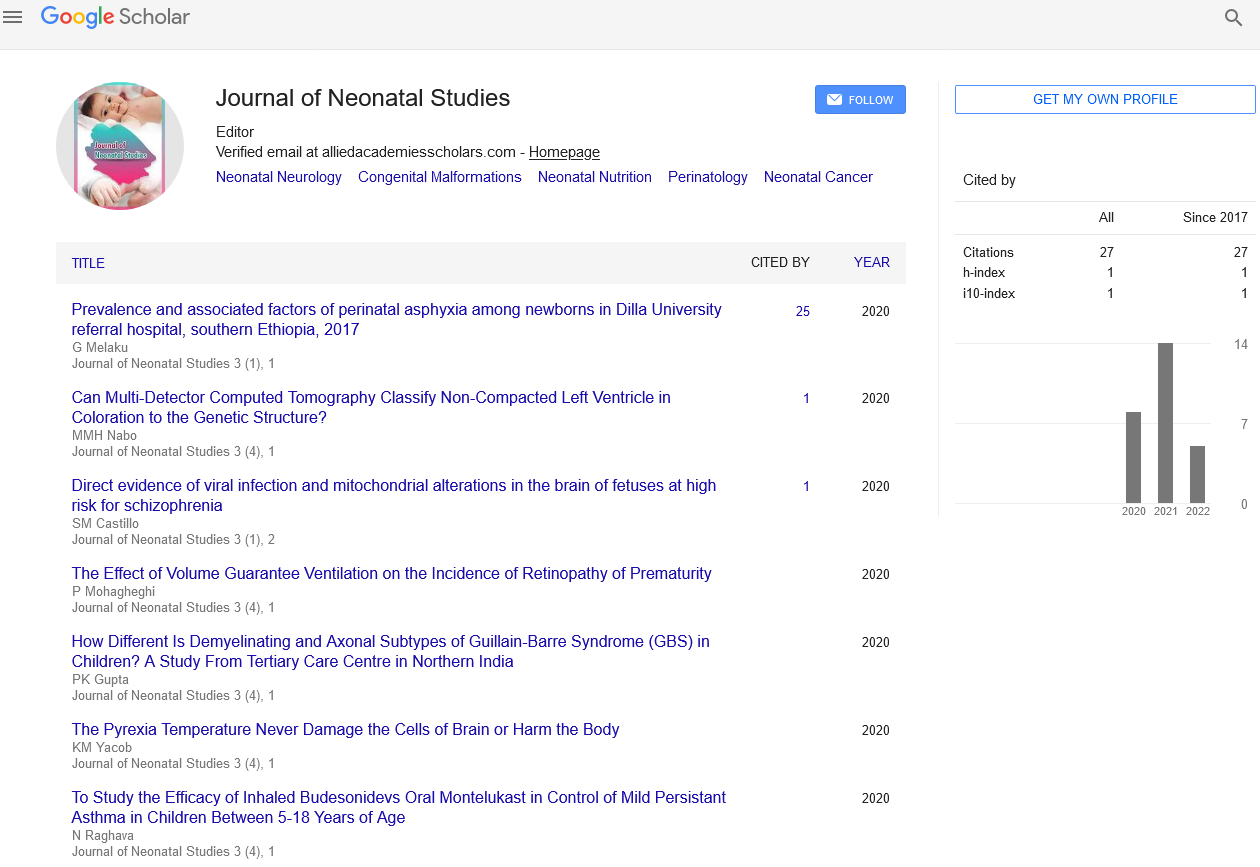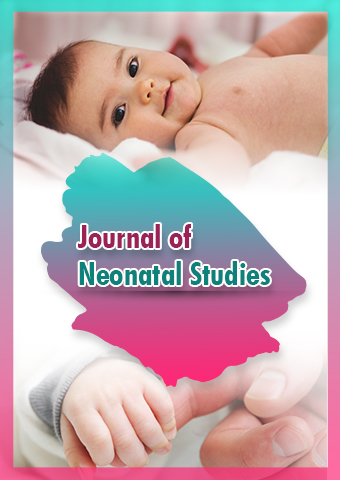Perspective - Journal of Neonatal Studies (2024) Volume 7, Issue 6
Cystic Fibrosis Newborn Screening: An Essential Step Toward Early Intervention
- Corresponding Author:
- Joao Pedro
Department of Neonatal Screening, Pontifical Catholic University of Rio Grande do Sul, Brazil
E-mail: joaopedro@icloud.com
Received: 04-Nov-2024, Manuscript No. JNS-24-150547; Editor assigned: 06-Nov-2024, PreQC No. JNS-24-150547 (PQ); Reviewed: 20-Nov-2024, QC No. JNS-24-150547; Revised: 24-Dec-2024, Manuscript No. JNS-24-150547 (R); Published: 31-Dec-2024, DOI: 10.37532/JNS.2024.7(6).312-314
Introduction
Cystic Fibrosis (CF) is a genetic disorder that primarily affects the lungs and digestive system. It is caused by mutations in the CFTR gene, which leads to the production of thick, sticky mucus that can clog the airways and trap bacteria, resulting in repeated lung infections and damage. Early diagnosis through newborn screening is crucial for managing the disease and improving the quality of life for affected individuals. This article delves into the importance, methodology, and implications of newborn screening for cystic fibrosis.
Description
Understanding cystic fibrosis
Cystic fibrosis is an inherited disorder that follows an autosomal recessive pattern, meaning both parents must carry one copy of the mutated gene for their child to be affected. The CFTR gene mutation impacts the regulation of chloride and sodium ions across cell membranes, leading to the production of thick mucus. This mucus primarily affects the lungs, pancreas, liver, intestines, sinuses, and sex organs.
Symptoms and complications
• Persistent coughing and frequent lung infections.
• Wheezing and shortness of breath.
• Poor growth or weight gain despite a good appetite.
• Greasy, bulky stools or difficulty with bowel movements.
• Salty-tasting skin.
Complications
• Chronic respiratory infections and inflammation.
• Pancreatic enzyme insufficiency, leading to malabsorption of nutrients.
• Liver disease.
• Infertility in males and reduced fertility in females.
Importance of newborn screening
Early diagnosis of cystic fibrosis is essential for initiating appropriate treatments that can improve health outcomes and reduce the severity of symptoms. Newborn screening for CF allows for:
• Early intervention with nutritional support and enzyme replacement therapy.
• Regular monitoring and management of lung infections.
• Improved growth and development.
• Better overall prognosis and quality of life.
The screening process
Newborn screening for cystic fibrosis is typically performed shortly after birth using a blood sample collected from a heel prick. The process involves several steps:
Immunoreactive Trypsinogen (IRT) test
• The initial screening test measures the
level of Immunoreactive Trypsinogen
(IRT) in the blood. Elevated levels of IRT
can indicate pancreatic damage, which is
common in newborns with CF.
• It’s important to note that high IRT levels
are not specific to CF and can be elevated
in other conditions or due to stress at birth.
DNA analysis
• If the IRT levels are high, a second test is
performed to check for mutations in the
CFTR gene.
• DNA analysis can identify common CF-causing
mutations, but not all possible
mutations. Therefore, a negative result does
not completely rule out CF.
Sweat test
• If the results from the IRT and DNA tests
are suggestive of CF, a sweat test is conducted
to confirm the diagnosis.
• The sweat test measures the amount of
chloride in the sweat, which is typically
elevated in individuals with CF.
Benefits of early diagnosis
Early diagnosis through newborn screening offers several benefits:
Timely treatment: Initiating treatment early can help manage symptoms and prevent complications, improving the overall prognosis.
Nutritional support: Early intervention with pancreatic enzyme replacement therapy and dietary modifications can support better growth and weight gain.
Regular monitoring: Frequent check-ups and monitoring allow for the early detection and treatment of lung infections, reducing the risk of long-term lung damage.
Family planning and genetic counseling: Families can receive genetic counseling to understand the risks of CF in future pregnancies and make informed decisions.
Challenges and considerations
Despite the benefits, there are several challenges and considerations associated with newborn screening for CF:
False positives and negatives
• The screening process is not foolproof and
can yield false-positive or false-negative
results.
• False positives can cause unnecessary anxiety
for families, while false negatives can delay
diagnosis and treatment.
Variability in screening programs
• Newborn screening programs and protocols
can vary by region and country, affecting the
consistency and accuracy of screening.
• Efforts are being made to standardize
screening protocols globally to ensure all
newborns have access to early diagnosis.
Ethical and privacy concerns
• Genetic screening raises ethical questions
about privacy, consent, and the potential for
genetic discrimination.
• Families should be informed about the
implications of genetic testing and have
access to genetic counseling.
Cost and resource allocation
• Implementing comprehensive newborn
screening programs requires significant
resources and infrastructure.
• Cost considerations must be balanced with
the long-term benefits of early diagnosis and
treatment.
Case studies and research
Several studies and real-world examples highlight the impact of newborn screening for cystic fibrosis:
The wisconsin newborn screening study
• One of the landmark studies demonstrating
the benefits of early diagnosis.
• Showed that infants diagnosed through
newborn screening had better nutritional
status, fewer hospitalizations, and improved
lung function compared to those diagnosed
later.
European consensus guidelines
• Developed to standardize CF newborn
screening across Europe.
• Emphasize the importance of early diagnosis
and coordinated care to improve outcomes.
Advances in CF treatment
• Research and development of new
therapies, such as CFTR modulators, have
revolutionized the management of CF.
• These treatments, combined with early
diagnosis through newborn screening, offer
hope for improved life expectancy and
quality of life for individuals with CF.
Conclusion
Cystic fibrosis newborn screening is a critical component of neonatal care that enables early diagnosis and timely intervention. The benefits of early diagnosis include improved health outcomes, better growth and development, and enhanced quality of life. While there are challenges and ethical considerations associated with genetic screening, the overall impact on public health is overwhelmingly positive. Continued research, standardization of screening protocols, and advances in treatment will further enhance the effectiveness of CF newborn screening and improve the lives of those affected by this genetic disorder.

